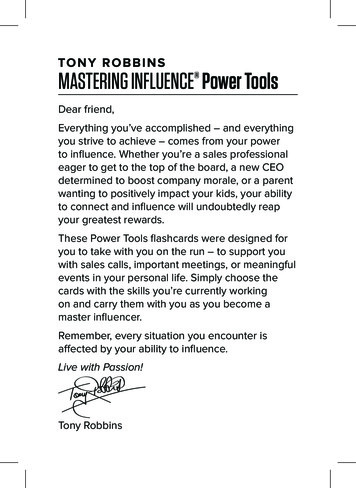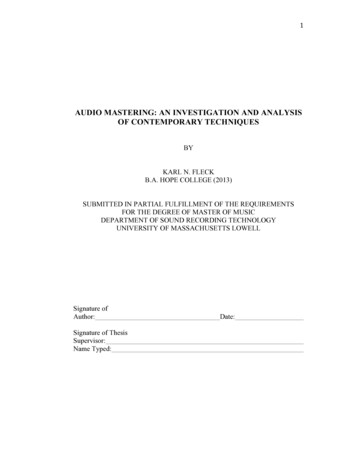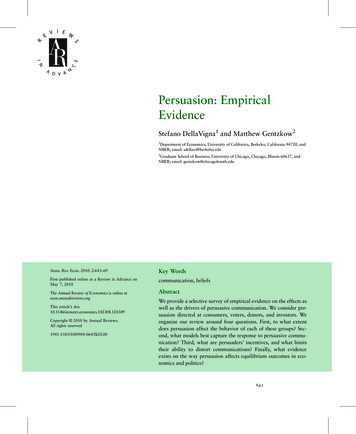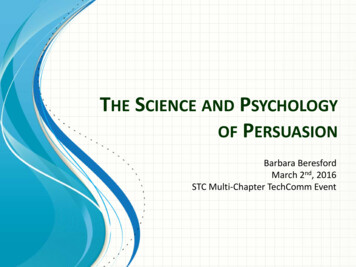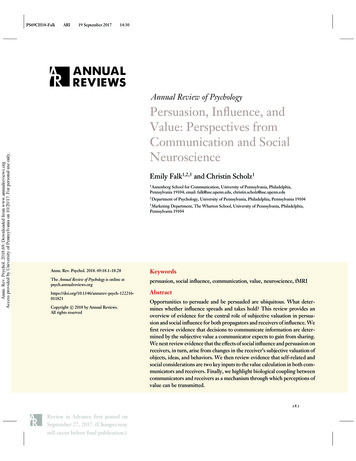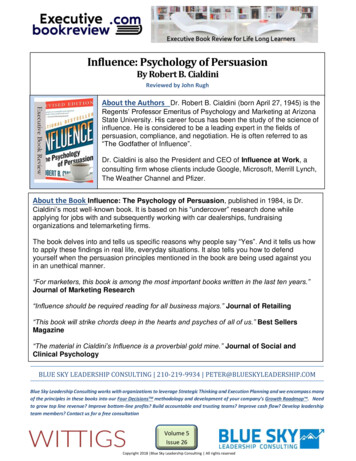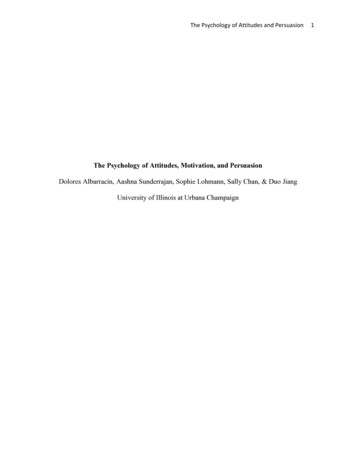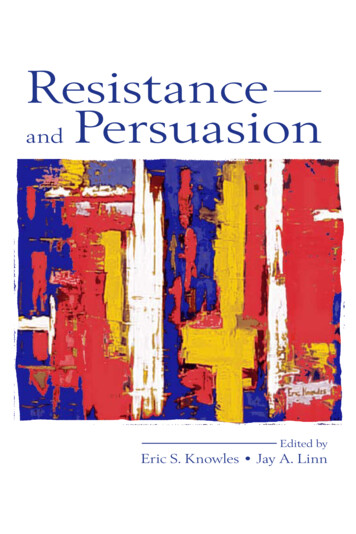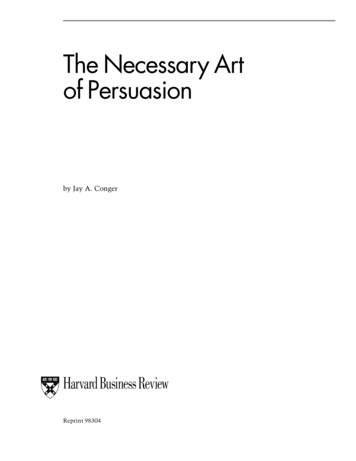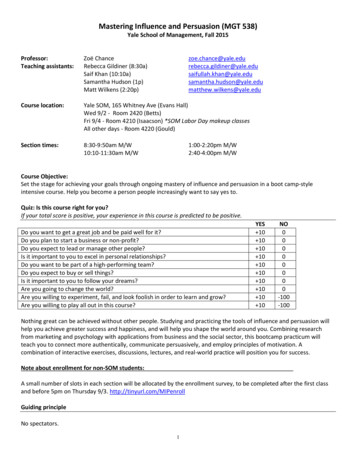
Transcription
Mastering Influence and Persuasion (MGT 538)Yale School of Management, Fall 2015Professor:Teaching assistants:Zoë ChanceRebecca Gildiner (8:30a)Saif Khan (10:10a)Samantha Hudson (1p)Matt Wilkens tthew.wilkens@yale.eduCourse location:Yale SOM, 165 Whitney Ave (Evans Hall)Wed 9/2 - Room 2420 (Betts)Fri 9/4 - Room 4210 (Isaacson) *SOM Labor Day makeup classesAll other days - Room 4220 (Gould)Section times:8:30-9:50am M/W10:10-11:30am M/W1:00-2:20pm M/W2:40-4:00pm M/WCourse Objective:Set the stage for achieving your goals through ongoing mastery of influence and persuasion in a boot camp-styleintensive course. Help you become a person people increasingly want to say yes to.Quiz: Is this course right for you?If your total score is positive, your experience in this course is predicted to be positive.Do you want to get a great job and be paid well for it?Do you plan to start a business or non-profit?Do you expect to lead or manage other people?Is it important to you to excel in personal relationships?Do you want to be part of a high-performing team?Do you expect to buy or sell things?Is it important to you to follow your dreams?Are you going to change the world?Are you willing to experiment, fail, and look foolish in order to learn and grow?Are you willing to play all out in this course?YES 10 10 10 10 10 10 10 10 10 10NO00000000-100-100Nothing great can be achieved without other people. Studying and practicing the tools of influence and persuasion willhelp you achieve greater success and happiness, and will help you shape the world around you. Combining researchfrom marketing and psychology with applications from business and the social sector, this bootcamp practicum willteach you to connect more authentically, communicate persuasively, and employ principles of motivation. Acombination of interactive exercises, discussions, lectures, and real-world practice will position you for success.Note about enrollment for non-SOM students:A small number of slots in each section will be allocated by the enrollment survey, to be completed after the first classand before 5pm on Thursday 9/3. http://tinyurl.com/MIPenrollGuiding principleNo spectators.1
Superpowers of influence & persuasion:You’ll practice these throughout the course, mostly outside of class.1. Getting (Asking): You’ll get real world practice making asks every week, building a toolbox of useful techniques.2. Giving & Gratitude: The law of reciprocity is one of the most powerful forces of influence. The more you helpothers and appreciate them, the more they’ll be willing to do for you. These practices will also keep your ego incheck as you discover how powerful you can be 3. Growing: Your tolerance for discomfort and uncertainty will determine your potential for success, and the moreyou practice stepping out of your comfort zone, the higher your tolerance will be. Therefore, social risks will be akey practice.4. Connecting: You’ll practice verbal and non-verbal strategies for building understanding, trust, and rapport, tohelp you connect quickly and authentically with others. When you have rapport, people want to say yes.Required materials:1. Influence: The Psychology of Persuasion, by Robert Cialdini (2006)ISBN 006124189X, Amazon price 10.69 paperback/ 2.99 KindleNote: If you like geeky details on experiments and results, get the academic version, Influence: Scienceand Practice (ISBN 0205609996, Amazon price 16)2. It’s Not All About “Me”: The Top Ten Techniques for Building Rapport with Anyone, by RobinDreeke (2013), ISBN 057809665X, Amazon price 8.95 paperback/ 2.99 Kindle3. 20 for donating in class (bring cash to your TA on 10/5Grade components:Weekly challenge journalParticipation (class and Facebook group)Team fundraising project (including peer evaluations)Homework assignmentsFinal exam30%25%25%10%10%Course format1. Weekly challenge journal: Every week, outside of class, you’ll be taking on challenges in Getting, Giving,Growing, and Gratitude. To help you learn from this practice, you’ll keep a journal to record and reflect uponyour experiences. Every 2-3 weeks, you’ll receive brief coaching feedback from your TA. And for your owngrowth and your peers’, you’re invited to post your experiences, questions, brags and failures on the Facebookgroup.2. Participation, in class and on the Facebook group: Because this is a practice-based class, if you show up, you’llparticipate. Attendance will be taken at the beginning of each class. Posting to Facebook and replying to others’posts will improve your participation grade, but won’t make up for missing class. (See grading policy.)3. Readings: There’s a lot of reading for a half semester course. Don’t read slowly to memorize and comprehendeverything; skim and highlight insights or suggestions relevant to your life.4. Homework: Whenever possible, assignments will relate to your own life, to make them engaging, helpful, andrelevant. “Prepare” or “Bring” assignments in the syllabus are not graded, but you’ll need to do them in order to2
be able to participate in class. Due assignments (Bigger and Better Slides, Team Fundraising Plan, 50Negotiation exercise, and Outcomes Survey) are graded.5. Final exam: The exam will cover the concepts, frameworks, and cases discussed in the course and illustrated inthe readings, and will ask you to remember and apply these. Before the exam, I’ll give you more detail aboutwhat to expect and how to prepare. (There will be no make-up exams except for documented medicalemergencies.)6. Team fundraising project: Teams will practice persuasion by raising money for a favorite cause for one month.At the end of the course, each team will present their fundraising strategy and results. Each member of the classwill donate 20 to a grant fund, and the money will be split between the presentation voted most persuasiveand the campaign that raised the most money outside of class. Guests from the charities will be invited toengage and celebrate with us.7. Peer coaching lunches: To give you an additional opportunity for feedback, TAs will be hosting brown baglunches open to students from any section. You can get and give coaching. This is an experiment, so we’ll try itfor a few weeks and see how it goes. Dates and rooms will be announced.Administrative PoliciesGrading:Homework assignments are graded pass/fail, with late assignments receiving an automatic fail. The journal andteam project are graded on a 0-3 scale. The final is graded on a 0-100 scale.Punctuality/attendance: We have 7 weeks to help you master a skill critical to your future success, so your presence isabsolutely necessary. Class begins on time, and attendance is taken immediately. Late arrivals hurt the learningenvironment and will be counted as absences. I do understand that things come up, so there is no penalty for oneabsence. However, a second absence will lower your participation grade. And three or more will reduce your finalgrade by at least one category (from a Proficient to a Pass, etc.) The only exception is in the case of a documentedmedical or family emergency, when requested by the dean/director of your program. There is no special treatmentof religious absences. If you miss a class, please check in with a classmate. Courtesy emails are unnecessary. Thereare more important things than classes or grades, and I trust your priorities.Laptops/phones/electronics: Please keep them stowed. They’re too tempting and distracting.Food/drinks: They’re fine as long as they don’t distract others.Deadlines: If you have an emergency and won’t be able to meet an assignment deadline, ask your TA for an extension assoon as possible. Without prior notice, failure to submit an assignment by the deadline will result in a zero.Emails: Contact your TA for: clarification and administrative questions, homework feedback, or issues with assignmentdeadlines. Email Zoë about issues that can’t be handled by a TA.Facebook: In your section’s secret Facebook group, you’re invited to post about your experiences and reflections (wecelebrate successes and fails), ask peers for advice, support your peers, and give them advice—but only if they ask.Your Facebook group is a SAFE space. No Facebook criticisms of your classmates, instructors, or the class, and nounsolicited advice. Please report violations to your TA. If you have any feedback about the class for me, you canshare it anonymously through the classesv2 feedback tool.Guests: You’re welcome to bring guests to class. Each guest is permitted to attend one session, and will be expected toparticipate in any exercises. Please introduce your guest to me before class begins, and I’ll ask you to introduce himor her to the group.3
CLASS SESSIONS*All assignments are due on classesv2 by midnight unless noted*Wednesday 9/2: LIFT OFFIn which we take flight. Where will we go? Will you remain aboard for the journey?ReadFlynn & Bohns (2012) “Underestimating One’s Influence in Help Seeking,” Chp 2 in Six Degrees of Social InfluencePost & Niemark (2007) “The Way of Generativity: Help Others Grow” Chp 4 in Why Good Things Happen to Good PeoplePost & Niemark (2007) “The Way of Celebration: Turn Gratitude Into Action,” Chp 3 in Why Good Things Happen to GoodPeopleGoff (2012) “Go Buy Your Books,” Chp 6 in Love DoesThursday 9/3: ENROLLMENT SURVEY, REQUIRED, BY 5PMALL students, hopefuls, and shoppers: http://tinyurl.com/MIPenrollFriday 9/4: DEVELOP STAR PRESENCEIn which you develop knowledge and skills to increase your powers of charisma, so others will want to follow you and tosay yes. Body, language, mindset, and actions.PrepareYeses and Nos exercise and reflection—bring to classReadCohen (2006) “Charisma,” Chp 8 in Win the CrowdCialdini (2006) “Authority: Directed Deference,” Chp 6 in Influence*This book is a required text and chapters will not be posted after this weekDue: Weekly Challenge Journal Week 1Wednesday 9/9: MICROPITCH FOR GOODIn which you refine, receive feedback on, and deliver a dazzling and inspiring 90 second pitch to recruit team membersto raise funds for the charity of your choice. And you rank your team selections.PreparePrepare and time your pitch. Rehearse at least 3 times before class.ReadDonovan (2012) “How to Craft Your Catchphrase,” Chp 3 in How to Deliver a TED TalkDonovan (2012) “How to Tell Stories,” Chp 8 in How to Deliver a TED Talk4
Friday 9/11Due: Bigger and Better slidesDue: Weekly Challenge Journal Week 2Monday 9/14: GIVE AND TAKEIn which we demystify the secret code of reciprocity. And you pick the Bigger and Better winners. And you grantwishes—and make one.BringThe biggest, best item you traded up for in the Bigger and Better gamePrepareDecide what ask you’re going to make in classReadCialdini (2009) “Reciprocation: The Old Give and Take And Take,” Chp 2 in InfluenceDreeke (2013) “Gift Giving (Reciprocal Altruism),” Technique 9 in It’s Not All About Me*This book is a required text and chapters will not be postedWednesday 9/16: WALK THE TALKIn which the magic of identity and consistency is revealed. Getting people to follow through.InviteInvite key players from your team’s charity to your final presentation. cc your TA.ReadCialdini (2009) “Commitment and Consistency: Hobgoblins of the Mind,” Chp 3 in InfluenceDiamond (2010) “Hard Bargainers and Standards,” Chp 4 in Getting MoreCialdini (2009) “Social Proof: The Truths Are Us,” Chp 4 in InfluenceDue: Fundraising PlanFriday 9/18Due: Weekly Challenge Journal Week 3Monday 9/21: RADICAL RAPPORTIn which you learn simple and sometimes surprising techniques for connecting instantly with other people, getting themto trust and like you. Verbal and non-verbal tools.ReadCialdini (2009) “Liking: The Friendly Thief,” Chp 5 in InfluenceDreeke (2013) “Accommodating Nonverbals,” Technique 2 in It’s Not All About MeCarnegie (1936/2010) “If You Don’t Do This, You Are Headed for Trouble,” Section 2.3 in How To Win Friends andInfluence People5
Wednesday 9/23: HANDLE RESISTANCE LIKE AN AIKIDO MASTERIn which you train in the art of welcoming and redirecting the force of another person’s resistance, to gain trust and towin over the most difficult people.PrepareObjections challenge worksheet—bring to classReadPantalon (2011) “Reinforcing Autonomy,” Chp 2 in Instant InfluenceDreeke (2013) “Ego Suspension,” Technique 5 in It’s Not All About MeDreeke (2013) “Establishing Artificial Time Constraints,” Technique 1 in It’s Not All About MeFriday 9/25Due: Weekly Challenge Journal Week 4Monday 9/28: NEGOTIATE LIKE A JEDIIn which you discover how to use the force and negotiate like one of the good guys—without giving up your power. Evenas you improve your outcomes, the other party will feel better about the deal.PrepareNegotiate The Player case with your assigned partner before class and bring your signed contract to class if you reacheda dealReadingsGreene (1998) “Use the Surrender Tactic: Transform Weakness Into Power,” Law 22 in The 48 Laws of PowerCarnegie (1936/2010) “The Secret of Socrates,” Section 3.5 in How To Win Friends and Influence PeopleWednesday 9/30: MARKET YOURSELF GRACEFULLYIn which you discuss and practice classy tactics for self-promotion, so you can let people know how wonderful you arewithout losing their respect in the process.PreparePrepare your PEEC statement (see Goldberg reading) and bring a written copy to classReadGoldberg (2011) “You and Your Elevator Pitch,” Chp 5 in Knockout NetworkingPozen (2012) “Managing Your Boss, Chp 11 in Extreme ProductivityFriday 10/2Due: Weekly Challenge Journal Week 5 – FINAL INSTALLMENT6
Monday 10/5: DEFENSE AGAINST THE DARK ARTS OF PERSUASIONIn which you learn to identify when dark forces of persuasion may be at work against you, and we discuss strategies forescape and defense.PrepareRSVP your guests for next week from the organization your team supported. Tell your TA so we can arrange parking andcommunicate with them about logistics.Bring 20 cash to your TA, for the class grant fundReadCialdini (2009) “Scarcity: The Rule of the Few,” Chp 7 in InfluenceGreene (1998) “Crush Your Enemy Totally,” Law 15 in The 48 Laws of PowerDue: 50 Negotiation write-upWednesday 10/7: TEST YOUR SKILL IN THE PERSUASION LABIn which you demonstrate your mastery of influence and persuasion by advising your classmates on their real-world,challenging issues. You’re also encouraged to solicit our advice yourself. How can we apply what we’ve been learning?PrepareThink about a situation you’d like to get advice on, and prepare to share the key issues with us in 1-2 minutesFriday 10/9Due: Outcomes SurveySaturday 10/10Due: Fundraising Presentation Slide DecksMonday 10/12: FUNDRAISING SHARES AND CELEBRATIONIn which your team fascinates and educates us with your successes, fails, and learnings from the fundraising project. Andyou vote on which cause should receive our class grant fund money. And we celebrate what we gave and got and howwe grew in this course. And we host esteemed guests from the charities we supported.ReadDonovan (2012) “How to Open Your Talk,” Chp 5 in How to Deliver a TED TalkDonovan (2012) “How to Conclude Your Talk,” Chp 7 in How to Deliver a TED TalkWednesday 10/14: FINAL E.In which you demonstrate that you did the reading and can apply the techniques we covered.7
Influence: The Psychology of Persuasion, by Robert Cialdini (2006) ISBN 006124189X, Amazon price 10.69 paperback/ 2.99 Kindle Note: If you like geeky details on experiments and results, get the ac
